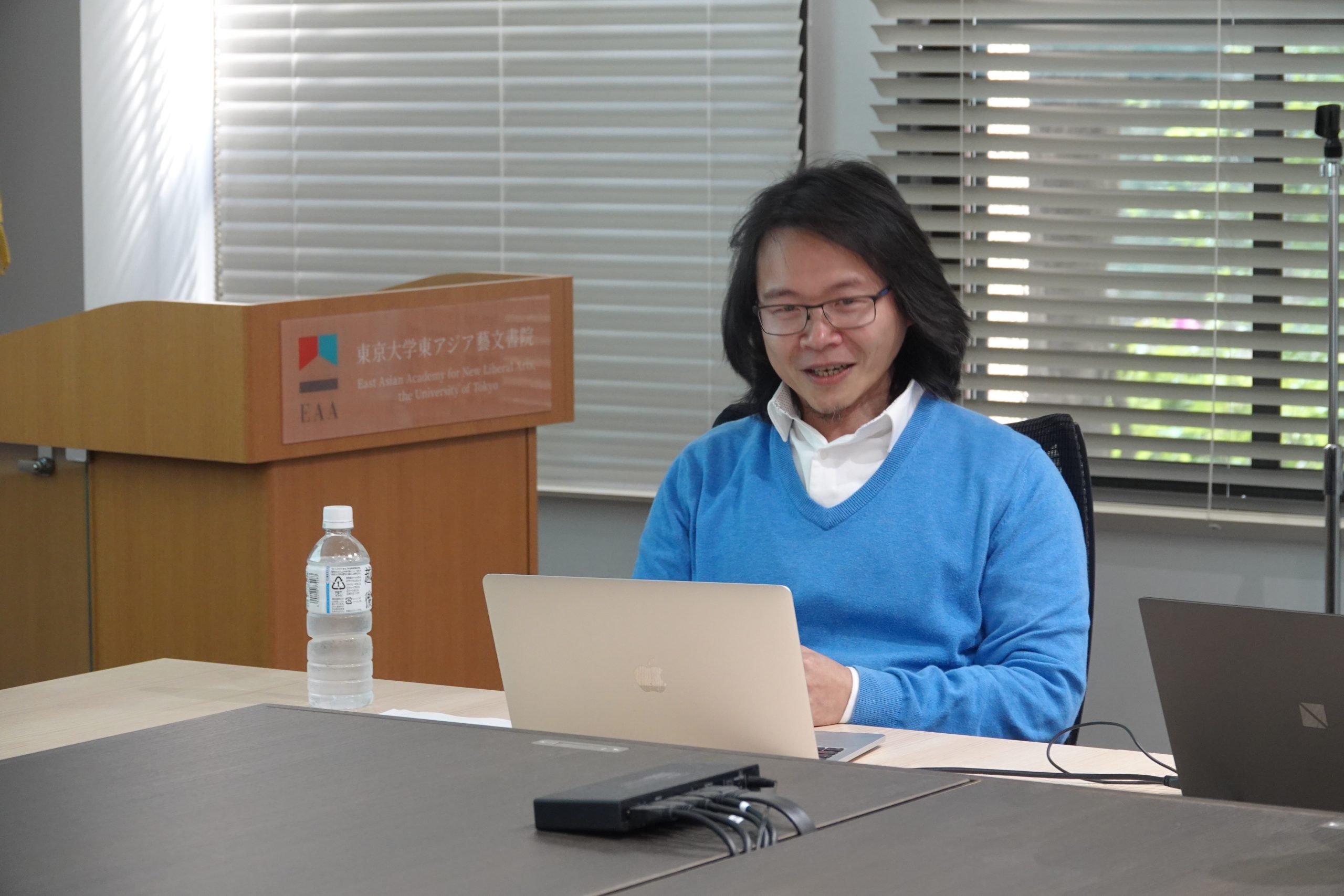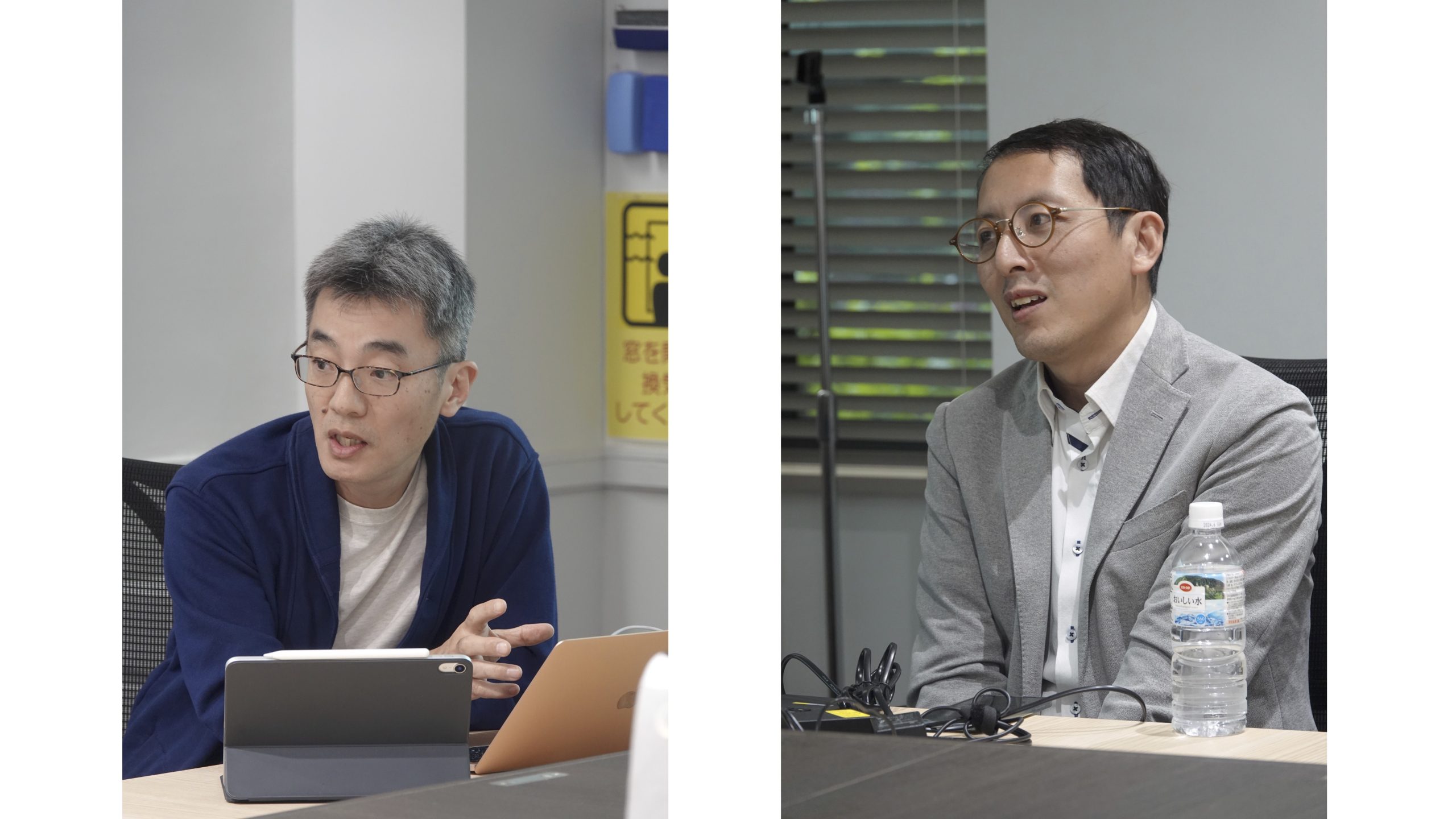On April 19, 2023, the EAA Workshop for “World Philosophy” was held in the EAA Seminar Room and on Zoom. Professor Yuk Hui (City University of Hong Kong), who is currently a visiting scholar at EAA and the Tokyo College, University of Tokyo, delivered a talk titled “Philosophy and Post-Europe.” The commentators were Professor Ishii Tsuyoshi (EAA director) and Professor Cheung Ching-yuen (the University of Tokyo), who was also the moderator of this workshop.
By drawing on Husserl, Heidegger, Derrida, Bernard Stiegler, and Jan Patočka, Prof. Hui shed light on the possibilities and conditions of a post-European philosophy in his talk. Of course, before considering a post-European philosophy, what “European philosophy” refers to needs to be made clear. According to Prof. Hui, European philosophy for Husserl is a philosophy devoted to grasp Being theoretically, and the spiritual image of Europe is deeply related to the pursuit of rationality under a worldview of teleology. Regarding Husserl’s argument, Derrida and Stiegler further paid attention to the specific relation between logos and technē with their remarks on the logocentrism and techno-logocentrism of European philosophy. As Prof. Hui argued, if Stiegler’s suggestion that technology is inherently accidental to the European logos is right, then we can say the essence of European philosophy as a kind of techno-logocentrism is also accidental.

However, the problem is that the accidental, contingent nature of European philosophy has been concealed by a teleological history of techno-logos, that is, by a spirit with self-consciousness that had been clarified by Hegel. Such a spirit, said Prof. Hui, colonized the world with industrial capitalism through several centuries of globalization and modernization. Following Stiegler’s claims, it turns out that what made European philosophy European and global is European technology as techno-logos, because it is driven by the European spirit which tends to “become conscious of itself and the necessity of its movement via its techno-scientific exteriorization” (quoted from Hui’s talk), though both philosophy and technology are essentially accidental.
Giving close analysis of similarities and differences in Stiegler’s and Patočka’s discussions about the crisis of Europe, Prof. Hui pointed out a blind spot there. According to him, the technological globalization accompanied by the expanding European spirit is still progressing in regions outside Europe like Asia and Latin America, thus obviously European technology has become omnipresent and is no longer limited to Europe.
To deal with such a post-European situation, Prof. Hui proposed an individuation of thinking by utilizing the term “individuation” in Gilbert Simondon’s sense. According to Prof. Hui’s explanation, the process of individuation refers to “the discovery of incompatibilities and the resolution of them in order to arrive at a metastable status.” In his opinion, there is no future for philosophy unless it becomes post-European, and this de-Europeanization requires an individuation of thinking conditioned by the arrival of the other as accident. As Prof. Hui concluded at the end of his talk, to imagine a common future which is “planetary” for human beings, we have to deal with the issue of technology and individuation rather than that of spirit.

After Prof. Hui’s talk, Prof. Ishii and Prof. Cheung made their comments. Prof. Ishii returned to the notion of individuation and showed that the way in which Chinese philosophy deals with chaos is quite different from a Hegelian teleology by taking the example of a short story known as “The Death of Hundun” (混沌の死) from the ancient Chinese text Zhuangzi (『荘子』). Prof. Cheung raised two questions about the future of phenomenology and Japanese philosophy. He noticed that phenomenology seems to be facing its end not only in Europe but also in East Asia, and he also was confused by the fact that even in Japan few people believe that there is such a thing called “Japanese philosophy.” They prefer to use terms like “Japanese thought” instead.
Prof. Hui’s talk reminded me of the Japanese philosopher Tosaka Jun (戸坂潤)’s criticism of anti-technology seen in Nihon-shugi (日本主義) and Bunka-shugi (文化主義) in the pre-war Japan. The arguers of Nihon-shugi and Bunka-shugi emphasized the crisis of spirit or culture and accused modern technology of bringing this crisis. These arguments, for Tosaka, assumed a kind of cultural form that is separated from technologies deeply related to the substructure of a society. He sensed the danger of slipping into fascism in such an attitude of anti-technology. Another point that impressed me is about the individuation of thinking discussed in the talk. It is not hard for us to find a discourse of anti-individualism in the intellectual history of pre-war Japan, and an interesting fact is that in some cases such anti-individualism was theoretically based on a criticism of the “principle of individuation” by utilizing the ideas of the so-called oriental philosophy (including Zhuangzi). I am looking forward to further discussions on these topics.
Reported by Guo Chiyang (EAA Project Research Fellow)
Photos by Viktoriya Nikolova (EAA Research Assistant)








